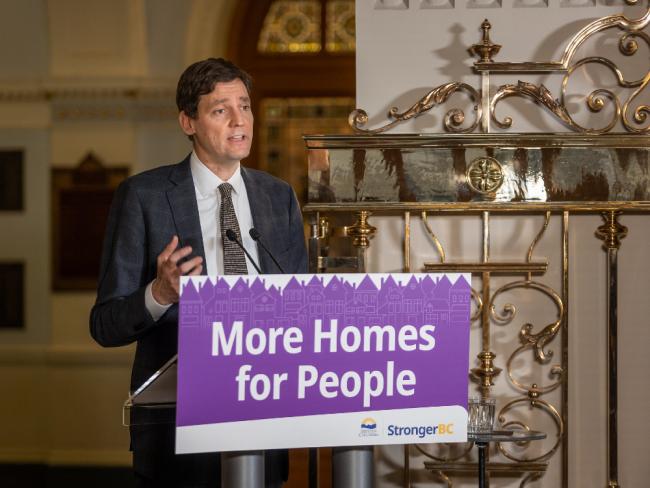Articles Menu

". . . BC Green Party Leader Sonia Furstenau said she was concerned that the bills failed to mention non-market housing or protect against real estate investment trusts buying and redeveloping strata housing.. . . " indeed!
Nov. 22, 2022
On Monday, the British Columbia government introduced two bills aimed at easing the province’s housing crisis.
“People are coming to this province in record numbers,” said David Eby, who was sworn in as premier on Friday. “We had more than 100,000 people move to B.C. last year and our housing supply is not keeping up.”
One bill changes the rules for condo stratas so that it will no longer be legal to bar owners from renting vacant units.
“It is simply unacceptable that a British Columbian who is searching Craigslist for a place to rent can’t find a home, and somebody who owns a condo is not permitted to rent that home to that individual,” Eby said.
The government says the bill will end rental restrictions in some 300,000 units throughout the province and that some 2,900 of them are likely to be made available for rent.
The bill also makes it illegal to require that everyone who lives in a unit be at least 19 years old, though buildings aimed at people over the age of 55 will still be allowed.
Eby told the story of someone he heard from when he was housing minister who faced eviction from a condo after she became pregnant. “It is equally unacceptable that a young couple that lives in a condo and decides to start a family has to start searching for a new home.”
Stratas will still be able to restrict short-term rentals in their buildings, he added, noting that the government plans to introduce additional restrictions allowing municipalities to more closely regulate short-term rentals.
The other bill introduced Monday allows the government to set housing targets in consultation with municipalities and to require them to report on their progress. Priority will be given to the eight to 10 municipalities with the greatest need and highest projected growth.
“Delivering housing is a key role for municipalities, and they need the support of the province to achieve the numbers that we need,” Eby said. “This framework sets out a mutually agreed target to hit in terms of that kind of housing that municipalities already know they need because of housing-needs studies that we’ve supported them to do.”
BC Liberal Leader Kevin Falcon characterized the bills as “too timid, too little, too bureaucratic.”
Eby was housing minister for two years before he became premier and should have been ready with measures that would flood the housing market with new supply, Falcon said. “Instead of the cannon I was expecting, today we got a popgun.”
Falcon criticized the government for planning to jam the legislation through this week without proper debate after it cancelled last week’s sitting of the legislature. “We should have been in this legislature debating this legislation so that we would have time to give it proper scrutiny,” he said.
Instead, he said, the government decided to limit the time in session so that Eby won’t have to appear in the legislature and be held accountable.
BC Green Party Leader Sonia Furstenau said she was concerned that the bills failed to mention non-market housing or protect against real estate investment trusts buying and redeveloping strata housing.
“We need to ensure that speculators and investors are not profiting from increased supply,” Furstenau said. “The source of the housing affordability problem we have today is that housing is treated as a financial asset instead of a human right. This problem has been made worse by a lack of federal and provincial government investment in non-market housing.”
There needs to be more housing in the province dedicated for renters that is “protected from exploitative market conditions,” she said.
Victoria Mayor Marianne Alto was at the legislature for the announcement. The new rules are “another critically important tool to create homes for our current and future residents,” she said.
The government’s announcement also quoted Vancouver Mayor Ken Sim, Surrey Mayor Brenda Locke, Saanich Mayor Dean Murdock, Langley Mayor Nathan Pachal and North Vancouver Mayor Linda Buchanan.
“By removing restrictions on strata housing units, this act will help deliver much-needed rental supply, making it easier for families with children to live and work in Vancouver,” Sim said.
“The collaborative approach toward housing targets is a critical step forward and will help ensure predictable increases in housing supply across the Lower Mainland,” he said. “This legislation goes a long way in addressing housing shortages in Vancouver and has my full support.”
During the leadership campaign, Eby presented a detailed housing plan that included a tax on property flippers, the legalization of secondary suites throughout the province and other measures that were not reflected in the announcement.
“There are a number of initiatives that our government needs to take around housing,” the premier said. “This is not the end, nor is it the beginning.... This is one more piece in our journey to deliver affordable housing to British Columbians and British Columbians will see more from us on this pressing issue for so many people in our province.”
The Housing Supply Act is expected to be brought into force in mid-2023 while the changes to the Strata Property Act will be in effect as soon as the legislation passes, which could be this week.
[Top photo: Premier David Eby says the new legislation is just part of the government’s response to the housing crisis. Photo via BC government.]